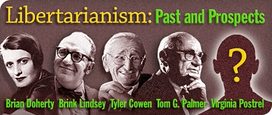Brian has been on a manic schedule of traveling and speaking this week (including a fine talk today at Cato), and as a result he’s been delayed in responding to the reaction essays. He should be weighing in tomorrow, but in the meantime I’ll invoke editor’s privilege and get the discussion started. In particular, let me join the dogpile at the bottom of which lies Tyler’s provocative essay.
I agree with Tyler insofar as he makes this ironic yet reassuring point: that the bloated expanse of contemporary government reflects the strength of freedom as well as its fragility. If relatively free markets were less productive than they actually are, then the burdens imposed by government regulations and transfers would be correspondingly heavier or at least more noticeable – and thus the incentives to organize and lobby for smaller government would be sharper. Sam Peltzman argues along similar lines in his essay on “Regulation and the Natural Progress of Opulence.” A big, strong dog can carry a lot of ticks.
But should we really just declare victory in the contest of liberty vs. power and move on to other things, as Tyler suggests? I don’t think so.
Tyler says that “the welfare state is here to stay, whether we like it or not.” I agree. But the question is: what kind of welfare state are we going to have? Is the status quo – in which the welfare state is dominated by universal entitlement programs that mostly shuffle money from one cohort of the middle class to another – really the best we can hope to achieve? Or is it possible to restructure the welfare state so that its primary focus is on the poor and temporarily distressed? The incentives for carrying out such a restructuring will be sharpening considerably over the coming years, as the costs of the existing commitments under Social Security, Medicare, and Medicaid escalate dramatically. At which point we will face a stark choice: either overhaul these programs substantially, or else endure a massive tax hike (increasing tax revenues as a share of GDP by several percentage points or more) to pay for them. I can’t imagine libertarians, Tyler included, sitting out that fight.
Tyler roots his welfare-state fatalism in evolutionary psychology, as he spells out in this podcast elaborating on his Cato Unbound essay. I find this analysis even less persuasive than the conclusion it generates. Yes, we may be hard-wired for sharing resources within our tribe, but quite clearly we can be acculturated so that this impulse is satisfied in ways other than a big national welfare state. Isn’t the history of the United States until the 1930s decisive evidence on that score?
Tyler’s confusion stems from the fact that our hard-wired ethos of small-group personal exchange is mirrored in the cultural ethos of small-group personal exchange that has prevailed for the vast majority of people throughout history. Liberalism flowered in the 18th and 19th centuries as an individualist ethos developed among Europe and North America’s middle and upper classes – and as the large majorities in the rural and laboring classes who still hewed to the old ethos lacked political representation. Democratization came, though, before the individualist ethos became widespread, and the rise of collectivism was the result. Here in the United States, the absence of a sizeable peasantry or proletariat allowed liberal institutions to flourish even with democratization – until mass immigration of southern and eastern European peasants, combined with the cataclysm of the Great Depression that delegitimized economic individualism, gave us our own (relatively limited, compared to Europe) dose of collectivism.
Collectivism isn’t our destiny. It’s an episode in the history of industrialization, caused by cultural lag. I would argue that the richer we get, the more culturally individualist we become – I’ve just written a book to that effect, anyway. Accordingly, I am optimistic about continuing the liberal revival that began in the 1970s – and about the role for libertarians in promoting that revival.

